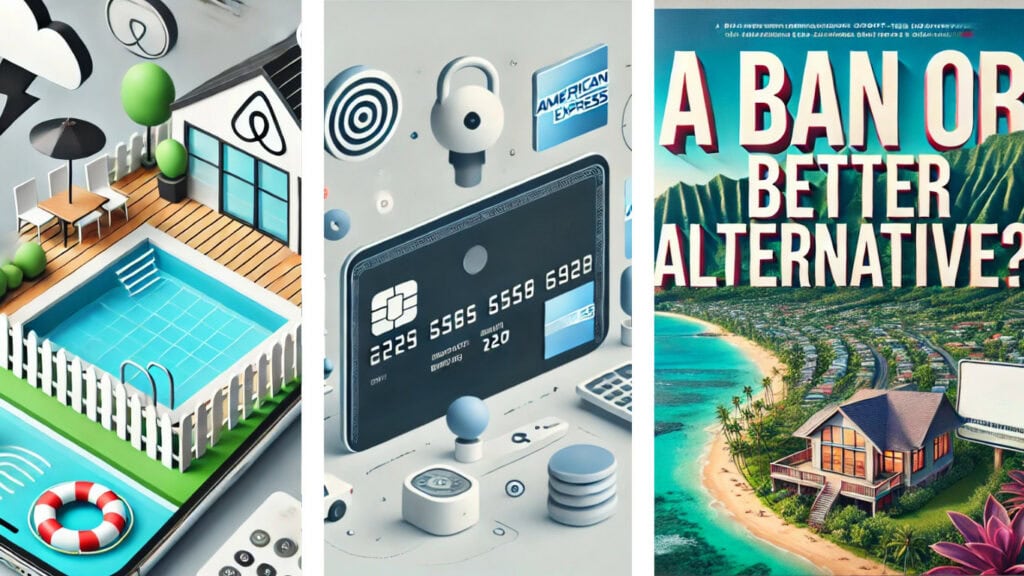Airbnb’s Latest Guidelines & Tips for Vacation Rental Managers
Key Takeaways for Vacation Rental Managers:
- As vacation rental managers, we know that the safety and security of our guests are top priorities. Recognizing this, Airbnb has recently updated some and reshared its guidelines on essential safety aspects, in collaboration with experts from Safe Kids Worldwide and Americares. These guidelines cover crucial areas like pool safety, smoke alarms, and extreme weather preparedness.
- Smoke and CO Alarms: As you know, Airbnb has been offering free smoke and carbon monoxide alarms to hosts with active listings for some time, and they’re emphasizing this initiative once again. It’s important to note that each listing is eligible for only one free alarm.
- Airbnb’s Strong Push for Pool Fences: In response to the increased demand for properties with pools, Airbnb has updated its pool safety guidelines in collaboration with Safe Kids Worldwide. These guidelines strongly recommend the installation of pool fences, supported by CDC data showing that pool fences can reduce the risk of child drowning by 83%. Also, especially for U.S. hosts who offer pools as an amenity. Airbnb has partnered with Life Saver Pool Fence to provide a special discount on pool gates.
- Extreme Weather Preparedness: Are Your Properties Ready for the Worst? In recent years, there has been increasing frequency and severity of extreme weather events—such as hurricanes, wildfires, and floods. Recognizing this, Airbnb has collaborated with Americares, a health-focused relief and development organization that responds to people affected by poverty or disaster. This partnership has offered recommendations including displaying essential emergency information for guests, performing regular maintenance to reduce property damage, and ensuring that emergency kits are well-stocked with necessities.
Snigdha’s View
- Even if your properties are already equipped with the necessary safety features, it’s crucial to effectively communicate these in your listing descriptions and guest manuals. Many hosts and property managers may have all the recommended safety measures in place, but they might not be adequately highlighting them to potential guests. By explicitly mentioning these safety features in your listings, you can attract more bookings, especially from safety-conscious travelers, and demonstrate your commitment to guest safety. Moreover, if your property currently lacks any of these safety features, now is the perfect time to address these gaps.
- While these safety guidelines are primarily directed at hosts and property owners, property managers have an important role to play in ensuring these recommendations are implemented effectively. As a property manager, it’s your responsibility to not only enforce these safety measures across the properties you manage but also to communicate their importance to the owners you represent. This proactive approach not only protects your guests but also strengthens your reputation as a diligent and responsible property manager.
- Airbnb didn’t develop these safety guidelines in isolation; they partnered with leading experts from organizations like Safe Kids Worldwide and Americares to ensure the recommendations were both practical and effective. These partnerships lend credibility to the guidelines, making them more than just suggestions, they are well-informed strategies designed to enhance guest safety. As a property manager, by following these expert-driven guidelines, you can be assured that you’re taking the right steps to protect your guests, which in turn helps to build trust and enhance your property’s reputation.
Topkey’s New Integration with American Express
Key Takeaways for Vacation Rental Managers:
- Topkey has announced a new integration with American Express.
- Topkey is a financial management platform designed specifically for vacation rental property managers. It simplifies and automates various financial tasks, such as tracking expenses, managing payments, and reconciling accounts.
- This integration allows U.S. Business and Corporate Card Members to issue virtual cards directly through the Topkey platform, complete with built-in controls and enhanced security features. This development is part of Topkey’s participation in the American Express Sync™ Commercial Partner Program.
- According to Topkey, this integration provides property managers with the ability to issue unlimited virtual cards tied to their existing physical cards. These virtual cards are claimed to offer precise control over expenses, improve security, and significantly reduce the need for manual reconciliation. Topkey positions this integration as a tool to enhance financial management and streamline expense tracking for property managers.
- To generate American Express virtual cards with Topkey, you must be an American Express Corporate or Business Card Member.
Snigdha’s View
- Clarity on What Topkey Really Does: At its core, Topkey is designed to help property managers keep track of their expenses more effectively. Imagine you’re managing multiple properties, each with its own set of expenses. Traditionally, you might use a single credit card for various purchases, leading to confusion later when trying to reconcile which expenses belong to which property. This is where Topkey’s integration with American Express comes in handy.
- Why Virtual Cards Matter for Property Managers: With Topkey, you can issue a virtual card for each property or even each employee. For instance, if you are a property manager responsible for multiple properties, you can use a different virtual card for expenses related to each property. This way, all transactions are automatically linked to the correct property, making it much easier to track and reconcile expenses.
- It’s designed to solve the real pain points of property managers: One of the biggest pain points for property managers is the process of reconciliation—matching expenses with the correct property or owner. Without a clear system, this can become a time-consuming and error-prone task. Topkey’s solution is to automate much of this process. By assigning expenses directly to a specific virtual card, property managers can see at a glance which expenses belong to which property, making end-of-month reconciliation much simpler and more accurate.
- Another benefit of using virtual cards is the added security. If you have employees or contractors making purchases on behalf of your properties, you can issue them a virtual card with a pre-set limit. This way, you can control spending and easily cancel the card if necessary, without the hassle of retrieving a physical card. This flexibility is particularly useful for managing short-term expenses or delegating tasks without sacrificing control.
- One aspect that shouldn’t be overlooked is the potential to earn rewards with American Express. Many small business owners use American Express for its rewards programs, which can include travel miles, cash back, or other perks. By integrating these virtual cards with your American Express account, you continue to earn these rewards on your business expenses, adding another layer of value to the service.
- Topkey’s integration with American Express offers a practical and innovative solution for property managers looking to streamline their already complex financial operations. At Rental Scale-Up, we see this as a valuable addition to any property manager’s toolkit.
Related article: Check out this engaging piece on Topkey, where Thibault Masson, Founder of Rental Scale-Up, interviewed Topkey CEO Jonathan Sukhia in “Streamlining Expenses in Vacation Rental Management: Topkey’s Innovative Approach.”
Maui’s Short-Term Rental Dilemma: A Ban or Better Alternative?
Key Takeaways for Vacation Rental Managers:
- What’s Happening in Maui? From Barcelona’s outright ban to stricter regulations in New York City and beyond, it’s clear that the tide is turning against short-term rentals. Now, Maui is the latest battleground in this growing conflict.
- Why It Matters? Here’s what makes Maui’s situation particularly interesting, and why you should pay attention: In this case, it’s not just about a top-down decision. People on the ground, and local stakeholders, are actively pitching in and suggesting that the government finds a middle ground. Rather than imposing an outright ban, there’s a push for solutions like increasing taxes on short-term rentals. This approach is different from what we’ve seen in other places.
- The Mayor has proposed a significant policy change that would revoke permission for over 7,000 properties currently operating as short-term rentals. This is part of a broader trend where cities and states are seeking to balance the booming short-term rental market with the pressing need for affordable housing.
- These properties, listed on what is known as the “Minatoya List,” have been allowed to continue renting in the short-term market since a legal clarification was issued in 2001. However, the Mayor of Maui is now planning to phase out these permissions, aiming to transition these units into long-term housing.
- The Broader Impact on Maui’s Economy: Maui’s economy heavily relies on tourism, and reducing the number of available short-term rentals might lower the island’s capacity to accommodate visitors, potentially leading to a decline in tourism revenue.
- The Middle Ground: Is There an Alternative?
In response to the proposed ban, a new UHERO blog by Assistant Professor Dylan Moore, published on July 29, suggests a middle ground between these extremes: a tax hike. “Increasing Maui’s property tax rate on STRs would likely achieve similar results: some STR properties would be turned to other uses, but the market would not be eliminated entirely,” writes Moore.
Snigdha’s View
- Some argue that Maui already imposes higher property taxes on short-term rentals compared to long-term rentals, with rates already ranging from 1.25% to 1.5%. While increasing these taxes further might seem like a balanced approach to converting more short-term rentals into long-term housing, there’s a risk that excessively high taxes could drive the least profitable short-term rentals out of the market. This could effectively reduce the number of available short-term rentals in a way similar to an outright ban but through financial pressure rather than legal restriction.
- Instead of outright bans or steep tax increases, cities could explore alternative solutions that balance the interests of homeowners, renters, and the tourism industry.
- Look at Who’s Behind the Information: When you hear about new rules like the ones in Maui to ban short-term rentals, it’s important to consider who is behind these changes and why. Sometimes, people or groups might push for these changes because they don’t want competition from short-term rentals.
- It’s also key to know that some of the content discussing these changes was posted on a university’s website but isn’t officially supported by the university. This means the opinions are just the authors’ views, not the university’s.
- Be Careful with “Neutral” Studies: Be cautious with studies that seem neutral, even from experts or universities—they can still have hidden agendas. For example, raising taxes on short-term rentals might seem like a compromise, but if the taxes are too high, it could drive rentals out of the market, similar to a ban. These ideas can spread, leading other cities to adopt similar rules without fully understanding the issue. Always question the source and whether the solutions address the real problem.







